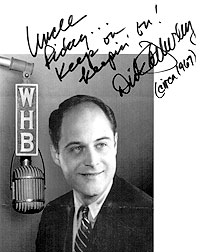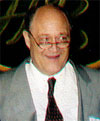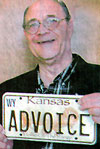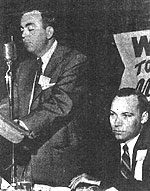 |
Our thanks to the late Richard W. Fatherley for this studio recording of his third presentation for the Kansas State Great Plains Radio Symposium. |
|
 He started his radio career in 1959 at WSTC in Stamford, Connecticut just after graduating from high school. He was with radio stations that changed the radio listening habits of America: KXOK/St. Louis, WFUN/Miami, WIBW and WREN/Topeka, and WDAF, KYYS and WHB/Kansas City in a career that spanned 50 years. While at WHB/Kansas City in 1957, as program director, he started the "Night Beat" program, the first regularly scheduled telephone talk show and the fore-runner of the all-talk radio formats of today. In 1983 he was named one of the nation's top radio personalities by Billboard and was inducted into the St. Louis Radio Hall of Fame in 2006.  Richard Fatherley, 2004 While Fatherley's name may not be a common household word, it's certain that most people have heard his unique deep, golden voice on radio and television commercials for John Deere, Jiffy Lube, Baskin-Robbins, Suburban Lawn and Gardens and many others, as well as on commercials and informational advertisements for the University of Kansas and many area schools and universities. His "AdVoice, LLC", company was nationally recognized in the voice-over commercial world.  Richard Fatherley, 2008 In addition to his broadcasting activities he was in the process of authoring a book, Radio's Revolution and The World's Happiest Broadcasters, the story of the origins of radio's Top 40 Format and Todd Storz. His book will be completed with his own memoirs by his family and friends. He was active in work with Kansas State University in their broadcasting and radio department activities and he was also one of the original organizers of the annual K-State "Great Plains Radio Symposium" — and known for his "Fatherley Advice". |
|
. . . Booze, broads and bribes . . . [Description by Uncle Ricky] This studio recording of Richard W. Fatherley (d. March 8, 2010) features Fatherley's original paper prepared for the third K-State Great Plains Radio History Symposium in 2008. The first-ever Pop Music Disc Jockey Convention & Radio Programming Seminar was sponsored by Storz' WHB and held in Kansas City at the Muehlebach Hotel on March 7, 8 and 9, 1958. Newly-employed Bill Stewart coordinated the event. Full-page ads in Broadcasting and other radio/TV magazines promoted free registration "open to all Disc-Jockeys, Program Directors, Record Industry Management Personnel and Broadcasting Industry Management Personnel." Stewart framed the convention as a seminar offering privileged information from high-dollar media experts, radio group executives and major-market air talent. A gala "All Star Show" featured Tony Bennett, The Four Lads, Laverne Baker, Andy Williams, The Crew Cuts, and many others.  Gordon McLendon, Todd Storz, 1958 The gathering was attended by many of the biggest names in radio at the time, including the Presidents of the Hooper and Pulse rating services, Gordon McLendon, well-known New York Disc Jockeys Martin Block, Jack Lacy, Al "Jazzbeau" Collins, Peter Tripp and Chicago's Howard Miller. Participating record companies included Columbia, DOT, Mercury, RCA-Victor, Atlantic, Roulette, Capitol, ABC-Paramount and Epic. Though Storz Executive VP and WHB General Manager George W. Armstrong promised a second Kansas City convention in March 1959, Bill Stewart later placed display ads in trade magazines announcing that the second convention would be held in May, 1959 at the glamorous Miami Beach Americana Hotel, near Storz' WQAM. The Miami Beach convention was a whopper, but it ended Stewart's career with the Storz organization. It attracted 2,500 attendees and became the springboard for allegations of pay-for-play to disc jockeys, known as Payola. According to Broadcasting magazine, "record company entertaining got out of hand." Storz sponsored the first-ever DJ convention in Kansas City, and the second in Miami Beach — which was the last. |
|
REELRADIO has additional exhibits related to this topic:
|


